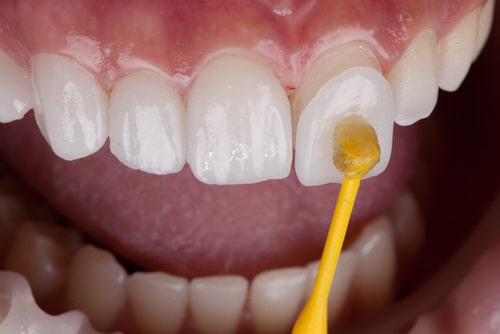 While it would be wonderful to receive a dental veneer and never need it replaced, that’s not usually the case. Dental veneers are much like crowns and fillings. They do a wonderful job at restoring your tooth’s function and help it look better, but they too can wear down and break down over time.
While it would be wonderful to receive a dental veneer and never need it replaced, that’s not usually the case. Dental veneers are much like crowns and fillings. They do a wonderful job at restoring your tooth’s function and help it look better, but they too can wear down and break down over time.
Understanding dental veneers and knowing the signs that they may need replacing can help you to make sure that you don’t go a day without your smile looking its best.
What Are Dental Veneers?
Dental veneers are a thin layer of porcelain that covers a tooth and can give it a very pleasing and natural look. Veneers are bonded to the front of your teeth and if needed can change a tooth’s shape, color, and size.
What Are The Signs That May Show That A Dental Veneer Needs Replacing?
There are a few signs on your dental veneers that should not be ignored:
- Chips and cracks on your dental veneer
- Decay or discoloration on the underlying tooth structure
- Separating or spacing between your tooth and the dental veneer
- Staining around the margins of your dental veneer
- Recession at gum line that is next to your dental veneer
Dental veneers don’t have a specific expiration date on them as they could last 15 years for some patients and 5 for another. If you notice any of these signs going on with your dental veneer, please reach out to your dentist and have them take a look. Ignoring these signs could lead to bigger problems down the road such as problems to your tooth structure under the veneer or problems with your gum tissue.
Is There Anything That Can Help Dental Veneers To Last Longer?
When it comes to the longevity of your dental veneers, the biggest factor in how long they will last is in how you care for them. Dental veneers should be brushed and flossed just as you clean all your other teeth; however, keeping these few things in mind will also help them to last for the long run:
- When brushing, use a soft-bristled toothbrush and non-abrasive toothpaste
- Continue with routine dental cleanings and exams as our staff will keep your veneer polished and also check for any signs of wear or damage
- If you grind or clench your teeth, wear a night guard at night
- Avoid chewing on things like ice of hard foreign objects as these things can chip your veneers
- Wear a bite splint when participating in sports as this can protect your veneers from any impact
Should I Get A Dental Veneer Or A Dental Crown?
Dental veneers and dental crowns each have their own place in the dental world. While they can be used in some of the same situations, they each seem to have their own set of reasons for being used.
Dental veneers tend to be used on anterior teeth or those teeth that are closest to the front of the mouth. Dental crowns are commonly used on any type of tooth in the mouth.
Since dental veneers are so thin, they only require that a small amount of the natural tooth be shaved off. They aren’t used on teeth that have lost a lot of tooth structure due to decay because a crown would be the better restoration type for this. Dental crowns cover the whole tooth and provide extra support to the tooth. When having a dental crown done more natural tooth structure must be removed for them to fit than what needs to be removed for a dental veneer.
Still wondering what is best for your situation? Give us a call at Bridge Creek Dental and our trained staff will help you figure out the best option for your situation. Getting a dental veneer could be an ideal solution to getting the smile that you have always wanted. We understand that it can feel like a big decision and our team is here to support you in every step of the process.